Why is it interesting to watch the film "Chernobyl" at the beginning, but unbearable in the end?
Miscellaneous / / April 15, 2021
The film was conceived as a worthy response to the HBO series, but it became the embodiment of the meme "Just don't copy it exactly."
On April 15, 2021, "Chernobyl" starts at the Russian box office - Danila Kozlovsky's directorial project, who also played the main role in it. The film, created with the support of the Cinema Fund and the Ministry of Culture of the Russian Federation, was supposed to be released in 2020, but the premiere was postponed due to the second wave of coronavirus infection.
Long before the release of the picture, it was clear that she could not avoid comparison with the eponymous serial 2019, commissioned by the American television channel HBO. The creators, however, argued that it makes no sense to put their project on a par with a foreign one, because they chose a different, more intimate way of storytelling.
The opening credits say that the film is "inspired by real events" at the Chernobyl nuclear power plant, as it were saying that viewers will definitely not see the same story a second time that the American-British competitor. But during the viewing, it is impossible to get rid of the thought that these two works are definitely very similar in plot, style, mood and general approach.
Eighties nostalgic paradise
To begin with, briefly about the plot: USSR, Pripyat, 1986. Hairdresser Olya (Oksana Akinshina) suddenly meets her old love - the handsome firefighter Alexei Karpushin (Danila Kozlovsky). 10 years ago, their whirlwind romance ended in excruciating break, but now the man insists on continuing the relationship. Moreover, Olya, as it turns out, has been raising his child all this time.
However, Lyosha's fickle nature casts doubt on his ability to be a good husband and father. In addition, at the Chernobyl nuclear power plant, it is at this moment that an accident occurs. And by chance, Karpushin turns out to be the only one who knows how to prevent a second, even more terrible explosion that threatens the whole world.
The tape begins with juicy, bright scenes full of nostalgia for Soviet life. And they are made surprisingly well. Ladies, sitting in a row, dry their hair in a hairdressing salon, and cheerful, swollen guys drive around the streets in Volga and Zhiguli. From time to time, details that are dear to the heart flicker in the frame: the then popular perfume Opium, tracksuits, a plexiglass gear knob with a rose inside and other signs of the past.
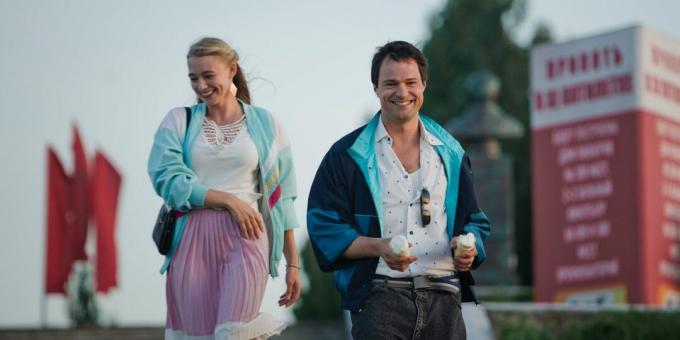
In a word, the first third of the picture is clearly the most lively and real. Shooting with a hand-held camera also contributed to the creation of an atmosphere of comfort and intimacy. She was in charge of Ksenia Sereda, filming "Call DiCaprio!", "Dylda" and "Acid". And if we talk about the film as a whole, you can't find fault with the camera work in it - it is at its best.
The heroine of Oksana Akinshina, despite the extremely restrained style of play of this actress, awakens sympathy for herself. Danila Kozlovsky also fits quite well into the archetype of a charming villain with a heart of gold.
At first, it's not even very embarrassing that so much time has been devoted to the romantic line. On the contrary, it inspires hope that the audience will have time to emotionally become attached to the characters before the dramatic part begins.
Manipulation instead of love and ridiculously frequent hero comebacks
But then something strange happens. Take at least a slightly discouraging episode in which Alexei almost forcibly forces the former passion to get off the bus so that she can walk with him, despite the clearly articulated "no."
Then Karpushin, having learned that he has a son, invites the newly found family to spend time together, but the next day he simply forgets about his promise. By the way, the reason that once forced the hero to leave the pregnant girl is not disclosed. However, what is happening suggests that at that time Lyosha just as easily threw his girlfriend out of his life.
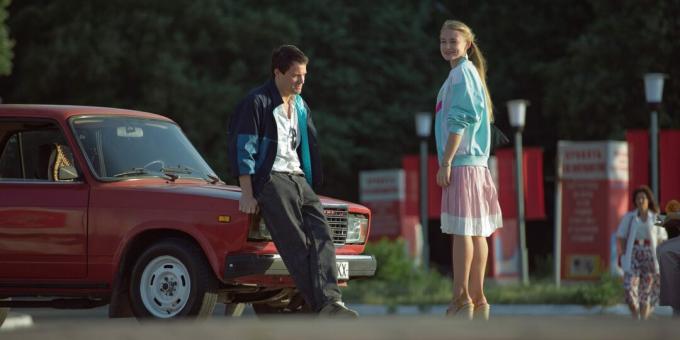
Alexei's relationship with his little son is also puzzling: the prodigal father gives the boy an expensive movie camera, but to the boy's direct question, "Are you my dad?" replies adamantly, "No, where did you get it?"
As a result, it becomes frustrating to watch the central character's emotional flips - let alone empathize with him. After all, Karpushin looks not at all a simple-hearted guy, a cheerful, cheerful and playful, as the scriptwriters are trying to portray him, but indifferent manipulatorworth running from.
The funny thing is that in between life-threatening tasks, Lyosha now and then finds himself trapped in a moral choice, but each time he returns like a real boomerang. At first, the undecided hero can still be understood, but when he changes his mind again and again in order to act like a decent person, it already causes a smile.
Similarity with a foreign competitor and Karpushin's invulnerability
Starting from the moment when the exposition ends and the drama begins, Danila's film wants to be described with the well-known meme “Just don’t copy it exactly”. Extinguishing scenes fire, high spans of the camera over the station - all this, if not copied from Craig Mazin, then at least gives rise to direct associations in the head.
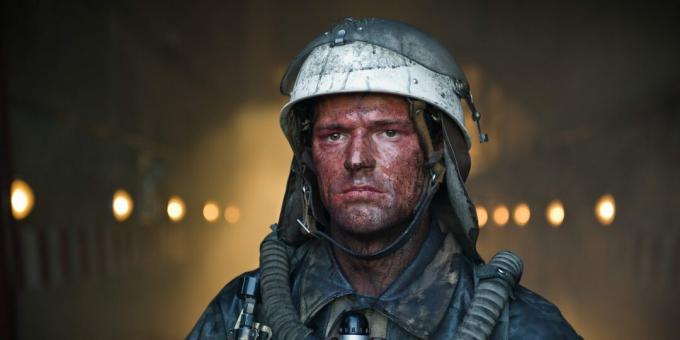
The final scenes with the participation of Oksana Akinshina do look like a free remake of the widely discussed shots, in which one of the heroines, for a bribe, is allowed into the ward to her husband, who is dying of radiation sickness. Even the disturbing strings that sound in the most dramatic moments seem to be trying to imitate Hildur Gudnadouttir.
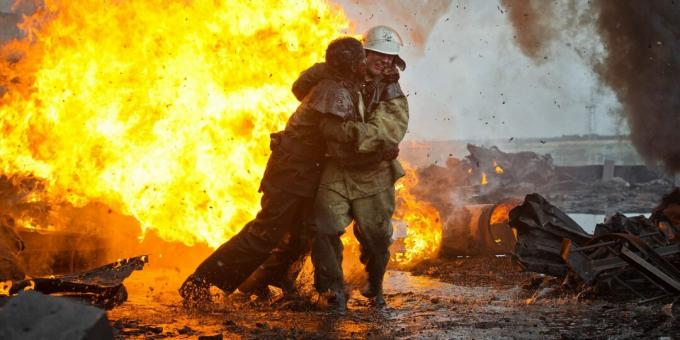
But the difference is, of course, obvious. First of all, because in the series Mazin was not superheroes. There, the director did exactly what the domestic filmmakers could not, - he told a story about ordinary people. After all, it is hardly appropriate to talk about a "catastrophe with a human face" (quote from an interview with the director), when the character of Danila Kozlovsky, over and over again, is chosen from the most risky squabbles with one single courageous scratch on a beautiful cheekbone.
The impenetrable Alexei is not taken by radiation either. In general, he is so invulnerable that Grigory Rasputin can envy his vitality, while the hero's comrades are seriously injured or die under the most cruel circumstances. Among other things, Lyosha carries his half-dead friend out of the fire, deftly drives an ambulance and dives like Ichthyander (it's only strange that he doesn't fly).
Obsessive patriotism and questionable morals
Worst of all, of course, is that the creators could not do without inappropriate slow-motion shooting and pretentious remarks about their duty to the Motherland. The screenwriter even managed to put the most uncomfortable phrase about Yuri Gagarin into the mouth of Alexei. Although it is doubtful that the liquidators would have started talking about precisely this at a moment of danger to their lives.
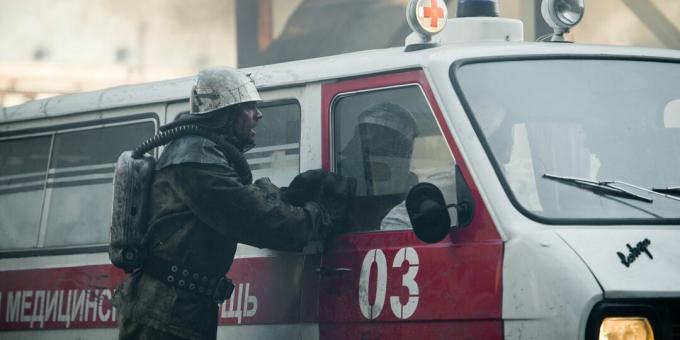
As if on purpose, to once again emphasize the difference between the Craig Mazin version and the domestic product, somewhere in the middle of the film, the question arises about who is to blame for the disaster. One of the heroes answers succinctly: "Who cares." Thus, as if to say: who are we to assess the decisions of officials.
Criticism of the leadership is heard only once, when a party functionary is reproached for his plan to “shut up the hole with the bodies of Russian guys ", - although in reality people of various kinds worked as liquidators nationalities.
Contrary to the assurances of the creators, the film failed to prove its creative autonomy. The series two years ago mercilessly showed the everyday horror of the disaster and posed difficult and terrible questions for the audience.
You forget about Danila Kozlovsky's cinema almost immediately, but it only makes you think about why domestic directors cannot just take and shoot a dramatic film without slow-mo and mention of Gagarin.
Read also🧐
- 20 biographical films that capture just as fictional stories
- "Minari": what attracts the film about the Korean family, which received six Oscar nominations
- Dementia, family ties and the great Anthony Hopkins. Why Father is both mesmerizing and frightening at the same time
- 16 films about the revolution, from which it is difficult to break away
- 12 historical films striking in their authenticity



